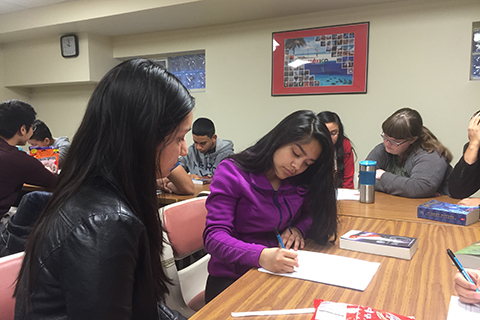
To conclude their semester in the OUWB-Hispanic Outreach Services Mentoring Program (HOS), the children at the community center performed skits, songs, poems and more about various health-related topics, ranging from personal hygiene to smoking to showcase the lessons that they learned from their OUWB mentors. This program is one of many organized by the OUWB-Hispanic Outreach Services Mentoring Program, a COMPASS community partner program that matches local Hispanic children with student mentors from OUWB.
This collaboration between OUWB and the Hispanic Outreach Services (HOS) began two years ago with Claudio Cortes, DVM, Ph.D., assistant professor of microbiology, and has since grown into an official mentoring program, in which medical students and mentees embark on both entertaining and educational activities and doctors present on relevant health-related topics.
These topics include dental hygiene, sugar content, stress, sleep, nutrition and more. According to Cortes, the parents report that the children are excited about the lessons, and often bring their new information home. “After the sugar-content session, one student went home and started checking the whole cabinet, pointing out which foods were healthy or unhealthy,” he says. Parents have also noted more frequent teeth-brushing, improved communication skills and heightened confidence.
Not only does the program hope to benefit the local children, but they also intend for medical students to walk away with an increase in both communication skills and cultural proficiency. “They feel more comfortable interacting with children,” Cortes says. “They understand the needs of children in general, but also specifically the needs of the Hispanic children in the community.”
This year, the program had a total of 1,080 service hours among 21 participating mentors and four student coordinators, who organized faculty presentations and plan activities. OUWB faculty members who participated by sharing their expertise with the children included Virginia Uhley, Celeste Farr, Asha Shajahan, Stephen Loftus and James Grogan.
“It is an incredible opportunity for medical students to be innovative – to create things for the community, and also to improve it,” Cortes says of the student coordinators. “It has been incredible to work with them.”
Mentor & mentee performances encourage cooperation
After a great deal of hard work and effort by both the mentors and mentees, Cortes and HOS Mentoring Program Coordinator Sorangel Feliz wanted to give students the opportunity to present upon the health-related topics that sparked their interests in a creative way. They worked with current M2 OUWB Student Coordinators Belinda Asare and Connor Whitaker to organize a showcase in which students could present skits, poetry, music and artwork.
“Every group chose a different topic that we talked about throughout the year,” Asare explains. “So, one group had a dental health skit, one did a skit on bullying…”
“We went to the Henry Ford Museum, so one group made a model truck out of clay, and then they used the truck as an analogy for wellness, hygiene and maintaining yourself,” Whitaker adds.
For the kids, this showcase acted as both an outlet to explore topics discussed with their mentors and a way for them to develop other skills.
“The students put a lot of work into these performances, which helps teach discipline and commitment while providing the students a source of pride at their accomplishments,” says Dalton Blood, M2 student mentor. “The performances also encourage collaboration and teamwork, not only between mentors and mentees, but also between groups of mentees.”
The co-student coordinators report that, as discipline and teamwork flourished throughout the preparation process, confidence followed. “When you find out what you’re good at, and you show people what you’re good at and they praise you for it, it makes you feel good,” Asare says.
According to Whitaker, the confidence boosted at this particular performance and throughout the year translates into better communication skills. “The first day, the students knew of each other; they see each other every week at church and everything, but they’d never really talked,” he says. “They were shy talking to anyone. Now, they’re comfortable interacting with each other, with us, and with their mentors. They’re able to talk about any problems they have, or about their days.”
The future of OUWB-HOS
Looking forward, Cortes has a few goals in mind for the future of this mentorship program. First, he hopes to get more local children involved to keep up with the increasing number of students eager to volunteer as mentors. Then, he plans to evaluate the program in terms of how the mentor/mentee relationship affects mentees’ academic performance, and eventually implement an SAT preparation segment.
Ultimately, he would like to incorporate more self-directed learning by giving the children the opportunity to choose what they’d like to learn about with their mentors. “We want to ask them what they’re interested in and have the mentor develop that,” he says. “One child may want to know if it is true that electronics are bad for sleeping. This student would then determine his or her own set of learning objectives. By implementing self-directed learning, the objectives stem from their own needs, and they want to find out.”
“We want to teach a generation of children that are able to create, to do research,” Cortes says.

